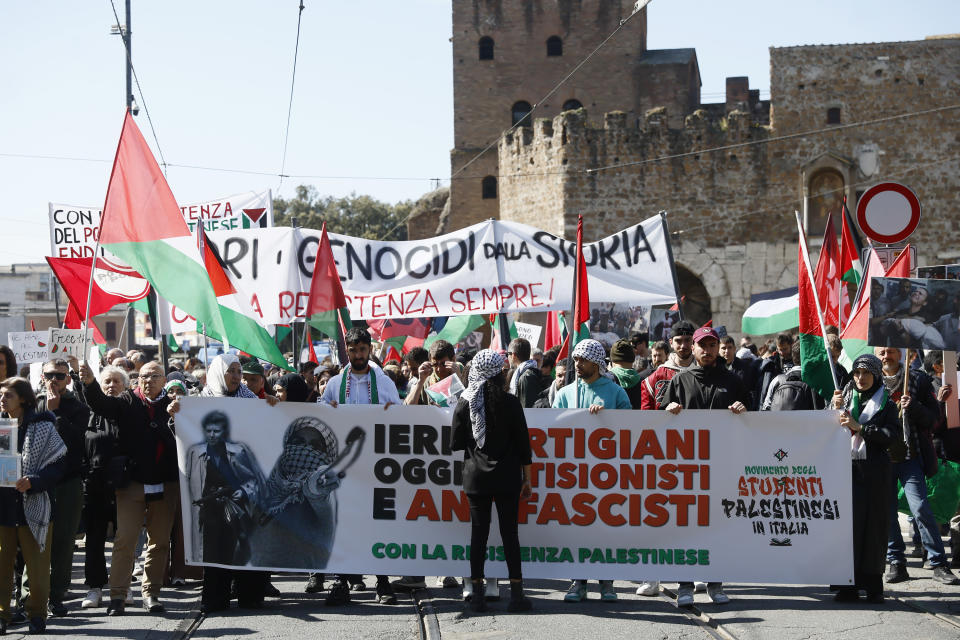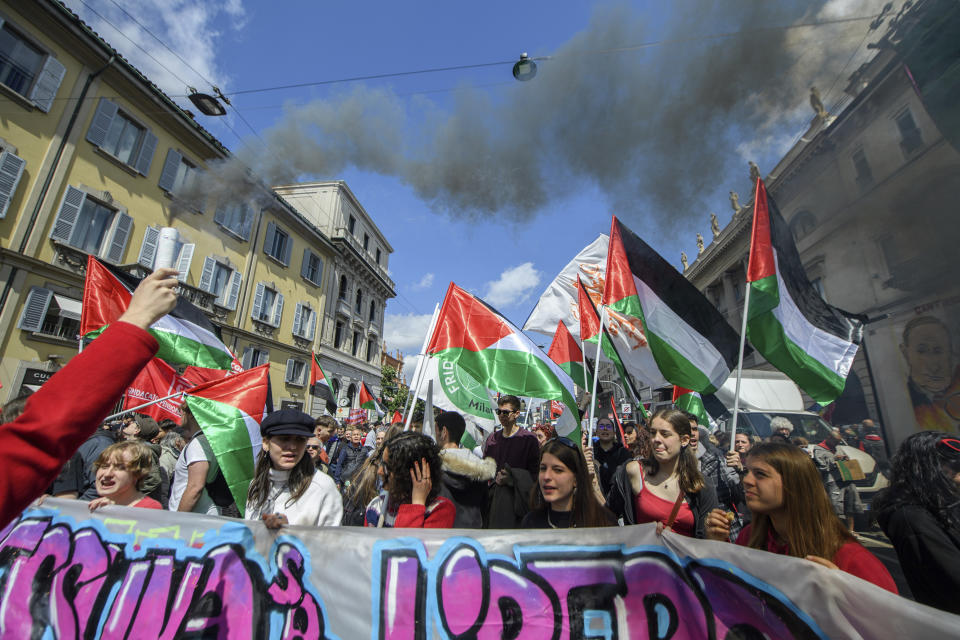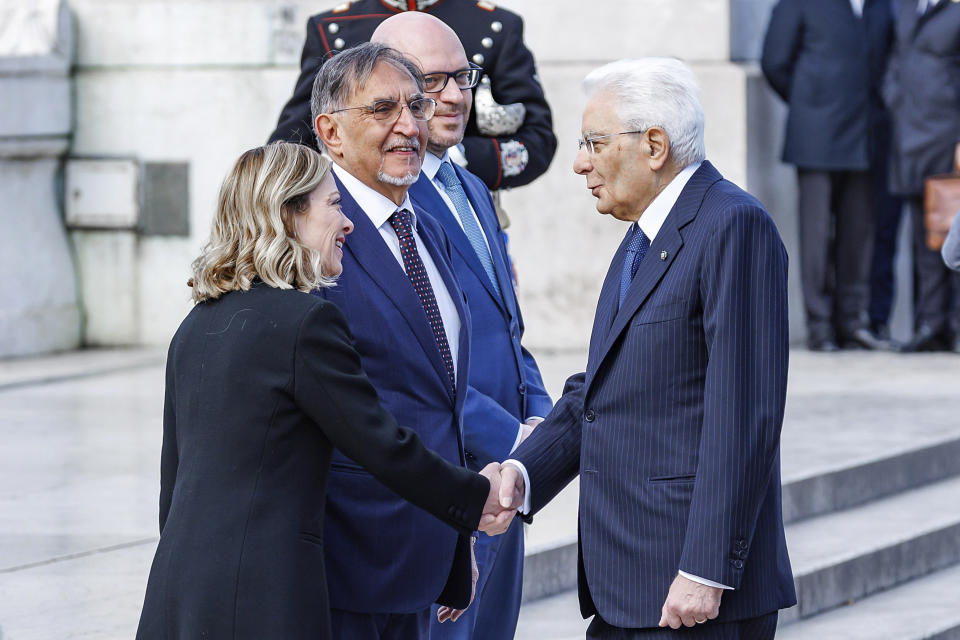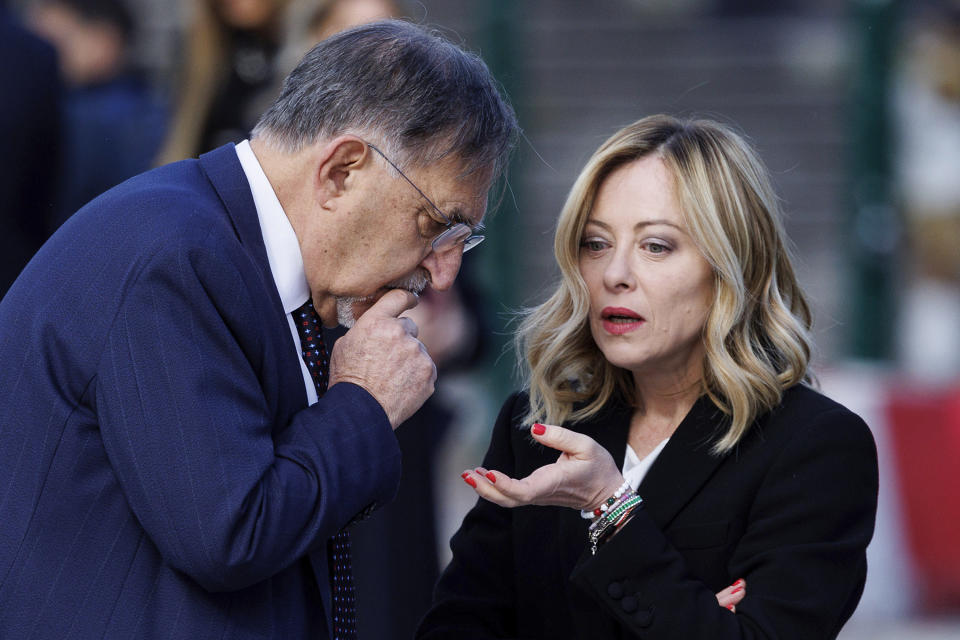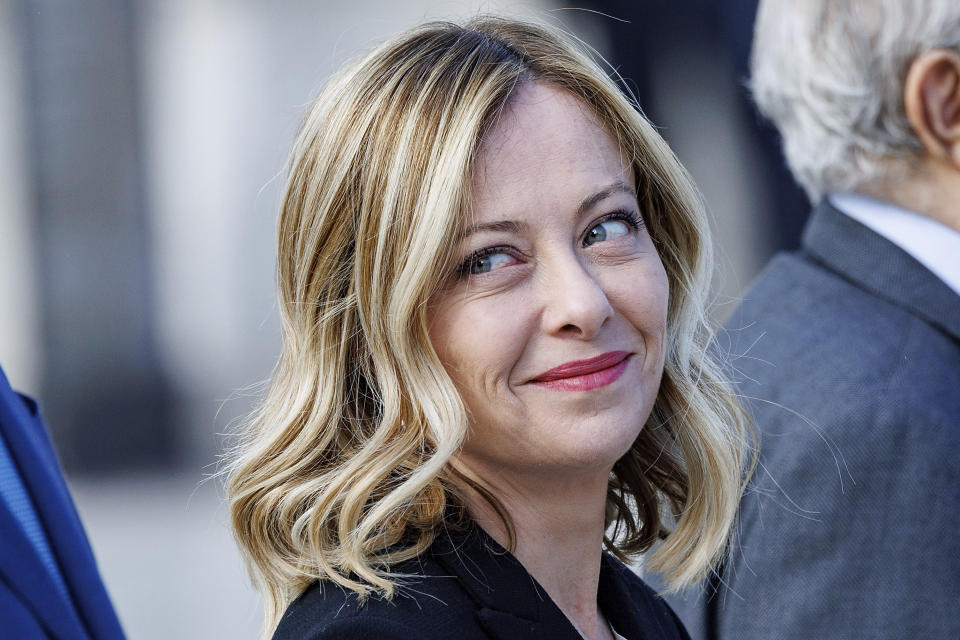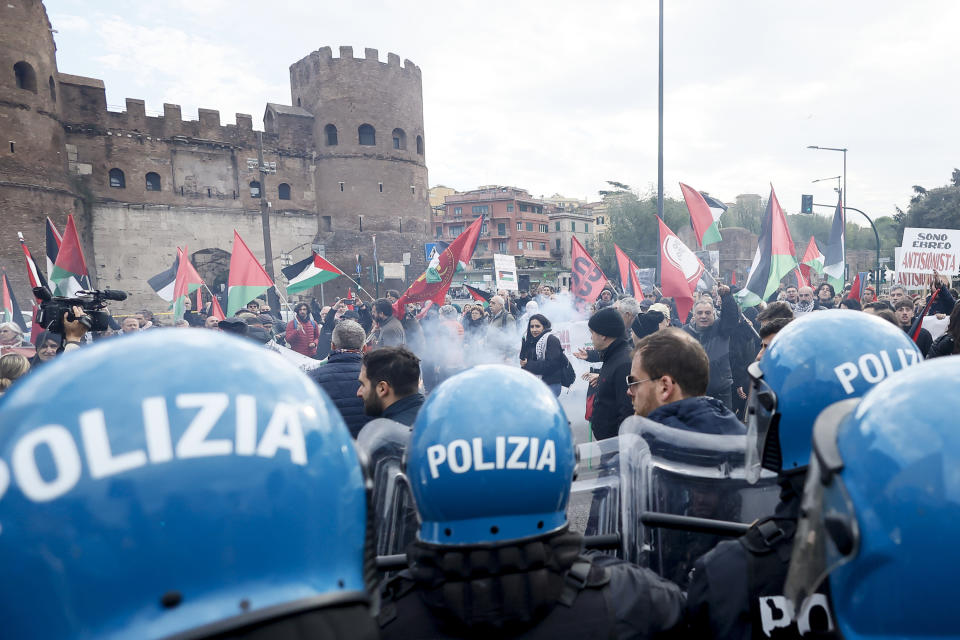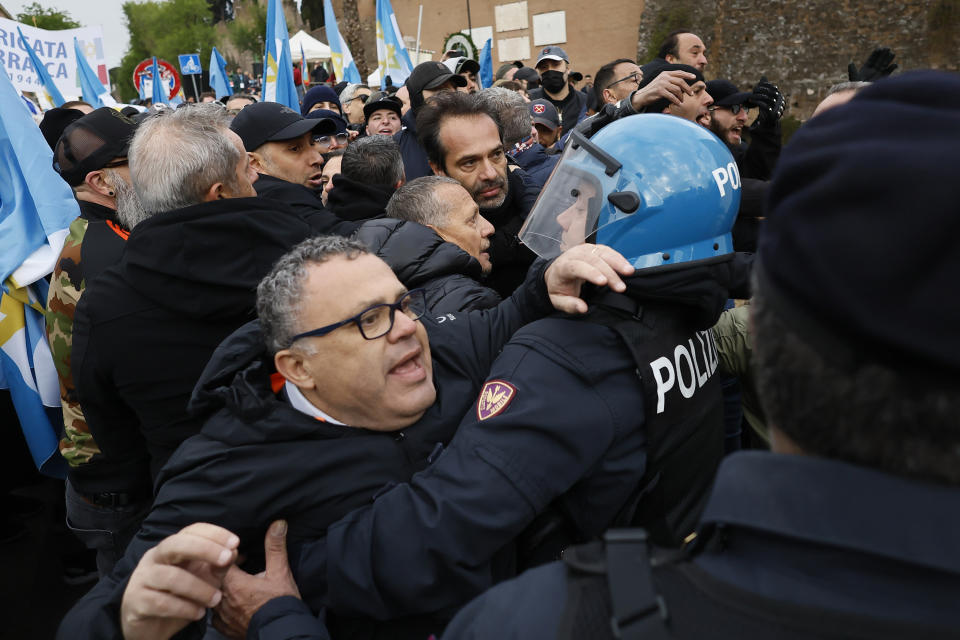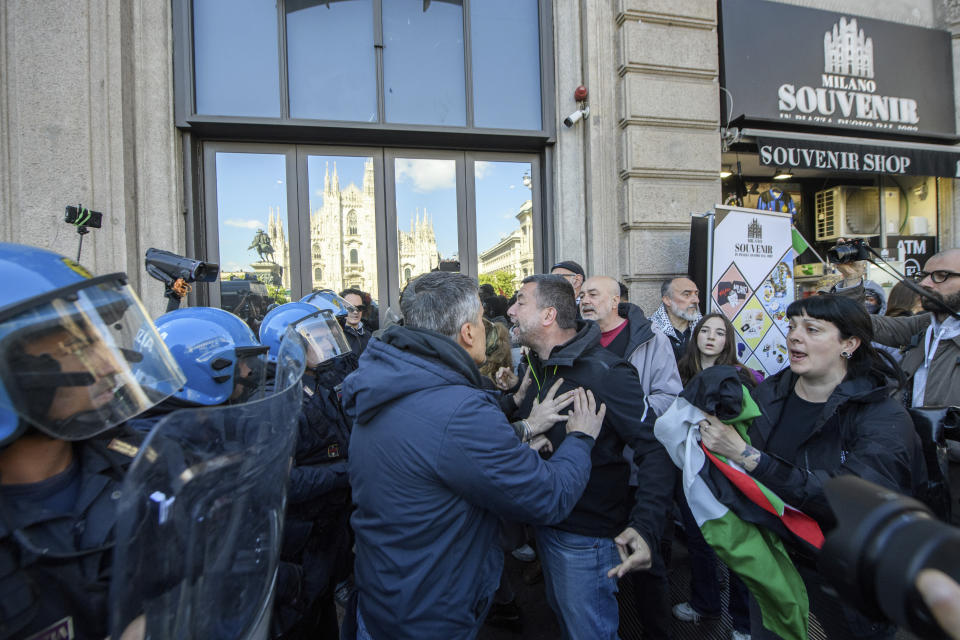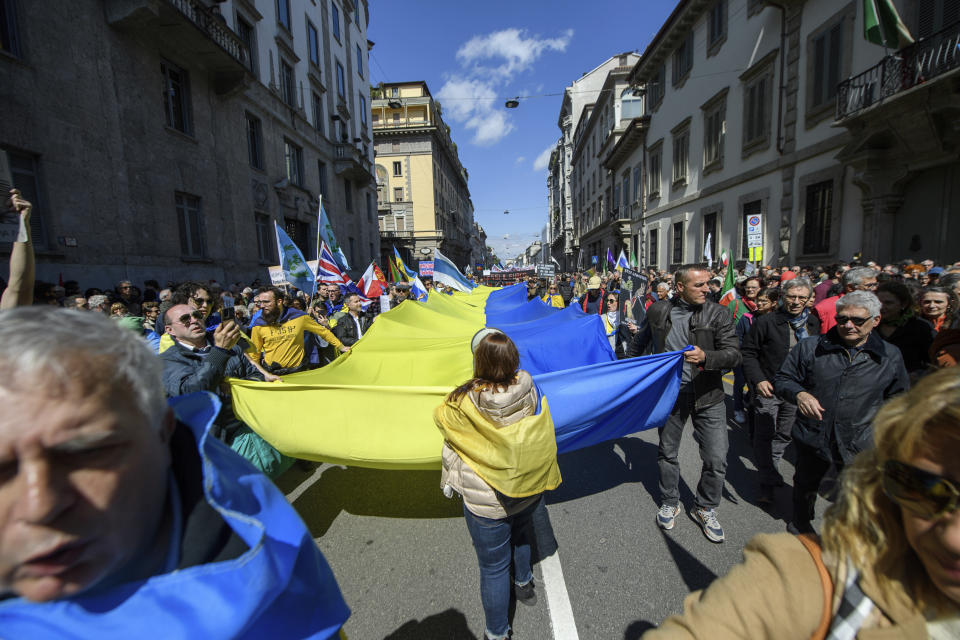Controversy over spiked antifascist speech dominates Italy's Liberation Day anniversary
- Oops!Something went wrong.Please try again later.
- Oops!Something went wrong.Please try again later.
ROME (AP) — Italy on Thursday marked its liberation from Nazi occupation and fascist rule with marches, monologues and a media controversy over the legacy of Italian complicity in the Holocaust and World War II-era crimes.
The day began with the solemn Liberation Day commemoration at Rome's tomb of the unknown soldier. Presiding was Italy's president and Premier Giorgia Meloni, whose Brothers of Italy party traces its roots to the neo-fascist movement that emerged after the fall of dictator Benito Mussolini.
It ended with marches, speeches and occasional clashes between police and pro-Palestinian groups who used the occasion to voice outrage at Israel's war in Gaza.
But inbetween, this year’s anniversary was overshadowed by a media storm over the decision by state-run RAI television to spike a planned Liberation Day monologue by an Italian author denouncing fascism and what he said was Meloni’s refusal to repudiate it.
The issue struck a nerve in Italy, where Meloni’s 2022 election as the first hard-right leader since World War II has revived criticism that Italians haven’t fully reckoned with their fascist past as ordinary Germans did with the Nazi era.
The suggestion that RAI censored Antonio Scurati’s monologue because it criticized Meloni and lingering neo-fascist sentiment in Italy has dominated newscasts for days, and probably drew far more attention to the text than it would have if RAI had aired it as planned.
Scurati is the author of the prize-winning volume “M,” about Mussolini’s rise and its parallels with the present day.
In the end, Scurati read the monologue aloud in person from the podium of Milan's main Liberation Day event Thursday, holding a red carnation as he read — the symbol of the Italian Socialists who opposed Mussolini's rise.
The text recounted two well-known incidents: the June 10, 1924 assassination of Giacomo Matteotti, a Socialist lawmaker opposed to fascism by Mussolini hitmen; and the 1944 massacres of Italian civilians during the waning period of Nazi occupation.
“These two concomitant mournful anniversaries — spring of ’24, spring of ’44 — proclaim that fascism was throughout its historical existence — not only at the end or occasionally — an irredeemable phenomenon of systematic, murderous and massacre-fueled political violence,” Scurati said. “Will the heirs of that history recognize this for once? Everything, unfortunately, suggests that they will not.”
Meloni has tried to distance her Brothers of Italy party from its neo-fascist roots and has gone out of her way to forge ties with Italy’s Jewish community. Her forces have backed a long-delayed project for a Holocaust Museum and have strongly supported Israel, including in its current war in Gaza.
But the opposition has accused Meloni and her forces of refusing to firmly declare themselves “anti-fascist.”
In a bid to put the issue to rest, Meloni in recent days published Scurati's essay on her own Facebook page with an introduction accusing the left-wing opposition of concocting a scandal where none existed.
In the post, Meloni said she didn't know who at RAI decided to cancel the Scurati appearance. But she noted that the state-run broadcaster had said it just didn’t want to pay Scurati the agreed-upon 1,800 euros ($1,930) "for a one-minute monologue.”
In an Instagram post Thursday, Meloni didn't refer to the controversy and again avoided using the term “anti-fascist.” But she celebrated how Liberation Day symbolized “the end of fascism” and "laid the foundations for the return of democracy."
“We reaffirm our aversion to all totalitarian and authoritarian regimes. Those of yesterday, which oppressed peoples in Europe and the world, and those of today, which we are determined to oppose with commitment and courage,” she wrote.
Italian President Sergio Mattarella, whose ceremonial position puts him above the political fray, took a harder line. After laying a wreath with Meloni at the tomb of the unknown soldier in Rome, he travelled to the Tuscan town of Civitella, site of a 1944 Nazi massacre of 244 civilians.
There, he demanded that Italians never forget the “Nazi-fascist barbarism” of World War II, including what he said was the fascist propaganda and censorship that sought to deny the massacres, murders, deportations and other crimes that took place on Italian soil.
“It is necessary — today and in the future — to remember those massacres and victims,” Mattarella said. “Without memory, there is no future.”
RAI has launched an internal investigation into the decision-making that led to Scurati's monologue being cancelled.
Perhaps predictably, the suggestion that the state-run broadcaster spiked a text critical of Meloni's governing party has drawn attention to it, with calls for mayors to use their Liberation Day speeches this year to quote from it.
“At the root, there is a rule not to be forgotten,” commentator Aldo Grasso wrote in Corriere della Sera. “Once a text is censored, there is a strong risk that the text itself is no longer controllable and goes its own unpredictable way." He termed it the "boomerang effect.’"
